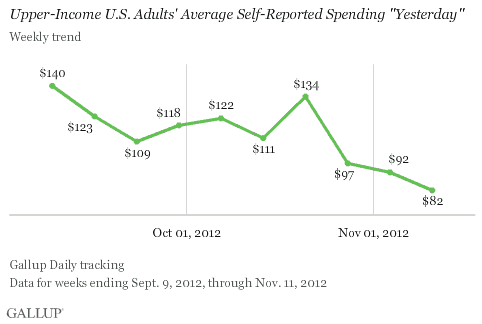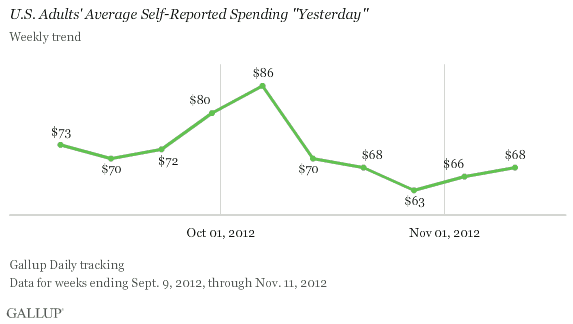The post-election focus on the fiscal cliff has implications not only for the long-term economic outlook, but also for the immediate future. There is no better illustration of the real world impact of current policy debates than the way self-reported upper-income consumer spending has plummeted during recent weeks. While many investors may be taking profits now in anticipation of higher taxes, other upper-income Americans may be pulling back on spending in anticipation of lower after-tax take home pay in 2013.
Upper-income spending, as monitored by Gallup, has fallen steadily since the first weeks of September -- falling below a weekly average of $100 during the last week of October -- down to $82 during the week ending Nov. 11, 2012.

While economic confidence increased during the election and has remained high since, consumer spending has not followed suit. The notable exception among upper-income consumers was when they splurged during October, most likely for Halloween spending. Upper-income Americans can spend when they feel they have a good reason -- even as they are pulling back on spending more generally. In turn, this implies that because upper-income consumers have, relatively speaking, more discretionary income than other Americans, they may decide to open up their pocket books for Black Friday, but then spend less as the holidays continue.
The decline in overall self-reported consumer spending has not been as pronounced as that among upper-income Americans. Weekly consumer spending results -- particularly among those with higher incomes -- tend to be more volatile than the monthly measurements Gallup reports.

While many upper-income Americans may not know a lot about the fiscal cliff, it is hard for them to ignore at least one general post-election consensus: federal income taxes on those with higher incomes are going to increase in the year ahead. For investors, this translates into increased tax planning and careful timing of gains and losses. For all upper-income Americans, this means less after-tax take home pay and, very likely, the deferral of major purchases. In turn, this could mean the holiday season will hold an even more intense competition for consumer purchases -- not to mention a lot less profit -- for the nation's retailers and small businesses during the 2012 holidays.
